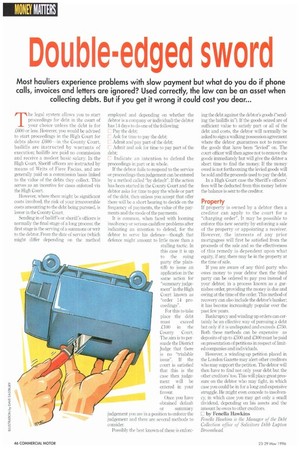Double•edged sword
Page 48

If you've noticed an error in this article please click here to report it so we can fix it.
Most hauliers experience problems with slow payment but what do you do if phone calls, invoices and letters are ignored? Used correctly, the law can be an asset when collecting debts. But if you get it wrong it could cost you dear...
The legal system allows you to start proceedings for debt in the court of your choice unless the debt is for £600 or less. However, you would be advised to start proceedings in the High Court for debts above £600in the County Court, bailiffs are instructed by warrants of execution; bailiffs are paid no commission and receive a modest basic salary. In the High Court, Sheriff officers are instructed by means of Writs of Fiere Facias, and are generally paid on a commission basis linked to the value of the debts they collect. This serves as an incentive for cases enforced via the High Court.
However, where there might be significant costs involved, the risk of your irrecoverable casts amounting to the debt being pursued, is lower in the County Court.
Sending in of bailiff's or sheriff's officers is normally the final stage of a long process; the first stage is the serving of a summons or writ to the debtor. From the date of service (which might differ depending on the method
employed and depending on whether the debtor is a company or individual) the debtor has 1,1days to do one of the following.
Pay the debt:
C Ask for time to pay the debt; E Admit and pay part of the debt; Admit and ask for time to pay part of the debt; IT Indicate an intention to defend the proceedings in part or in whole.
If the debtor fails to respond to the service or proceedings then judgement can he entered by a method called "by default". If the action has been started in the County Court and the debtor asks for time to pay the whole or part of the debt. then unless you accept that offer there will be a short hearing to decide on the frequency of payments, the value of the payments and the mode of the payments
It is common, when faced with looming insolvency or serious cashflow problems after indicating an intention to defend, for the debtor to serve his defence—though that defence might amount to little more than a stalling tactic. In this case it is up to the suing party (the plaintiff) to issue an application in the same action for "summary judgement" in the High Court known as 'order 14 proceedings-.
For this to take place the debt must exceed £100 in the County Court. The aim is to persuade the District Judge that there is no "trialable issue". If the court is satisfied that this is the case then judgement will be entered in your favour.
Once you have obtained default or summary judgement you are in a position to enforce the judgement nod there are several methods to consider.
Possibly the best known of these is enforc
ing the debt against the debtor's goods ("sending the bailiffs in"). If the goods seized are of sufficient value to satisfy part or all of the debt and costs, the debtor will normally be asked to sign a walking possession agreement where the debtor guarantees not to remove the goods that have been "levied" on. The court officer will then agree not to remove the goods immediately but will give the debtor a short time to find the money. If the money owed is not forthcoming the levied goods will be sold and the proceeds used to pay the debt.
In a High Court case the Sheriff's officers' fees will be deducted from this money before the balance is sent to the creditor.
Property
If property is owned by a debtor then a creditor can apply to the court for a "charging order". It may be possible to enforce this new security by enforcing a sale of the property or appointing a receiver. However, the interests of any prior mortgagees will first be satisfied from the proceeds of the sale and so the effectiveness of this remedy is dependent upon what equity, if any there may be in the property at the time of sale.
If you are aware of any third party who owes money to your debtor then the third party can be ordered to pay you instead of your debtor, in a process known as a garnishee order, providing the money is due and owing at the time of the order. This method of recovery can also include the debtor's banker; it has become increasingly popular over the past few years.
Bankruptcy and winding up orders can certainly be an effective way of pursuing a debt but only if it is undisputed and exceeds .£750. Both these methods can be expensive as deposits of up to £500 and £300 must be paid on presentation of petitions in respect of limited companies and individuals.
However, a winding-up petition placed in the London Gazette may alert other creditors who may support the petition. The debtor will then have to find not only your debt but the other creditors too. This will place great pressure on the debtor who may fight, in which case you could be in for a long and expensive struggle. He might even concede to insolvency, in which case you may get only a small dividend, depending on his assets and the amount he owes to other creditors
C by Fenella Hawkins
Fendla Hawkins is the Manager of the Debt Collection office of Solicitors Dibb Lupton Brooinhead.




















































































































